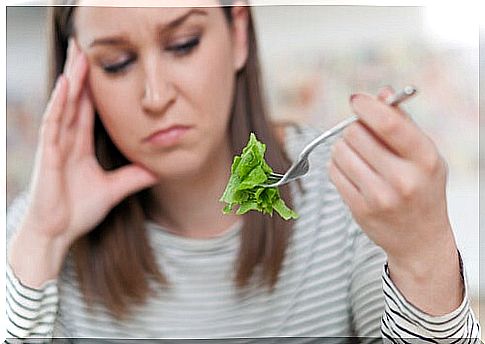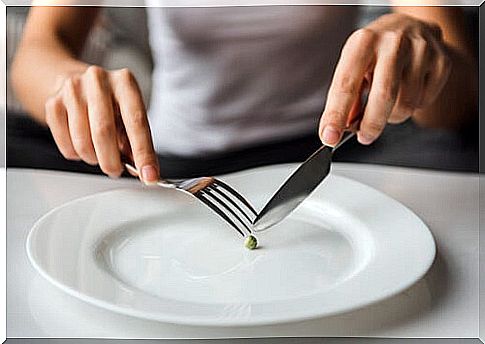Orthorexia, The Obsession For Healthy Food

Eating foods low in saturated fat, cholesterol, salt or sugar is one of the usual medical recommendations. However, the obsession for each milligram of food that we put in our mouth or orthorexia, in addition to being unhealthy, can hide an underlying mental disorder
The difficult thing about these obsessive cases is the identification of the symptoms. The people who star in them tend to have a healthy appearance, so it is very difficult to know when they cross the line that separates a good habit from another sick one. So the question is what is that line?
What is a healthy diet?
Eating healthy is having a complete, varied and balanced nutrition. There is no food that contains all the nutrients that the body needs, hence it is so important to include in our dishes the different food groups (fruits, vegetables and cereals, meats …). All are essential and must be ingested in the amounts that our body needs.
For this reason, it is very healthy to vary the usual diet and try to include everything. Only in this way can we provide the body with the energy it needs for day to day and maintain its optimal functioning.
How Eating Healthy Can Be Unhealthy?
Everything taken to the extreme can be harmful. In this case, although a priori eating healthy is a “pseudo-healthy” behavior, if you live by and for this it becomes an obsession. The pathology associated with this behavior is orthorexia. Defined in the year 2000, although for many it is a perfect unknown.

This conduct disorder is characterized by the development of extremely rigid eating habits, based on control of the nutritional components of food and the demonization of certain foods.
People with orthorexia only eat products from organic farming, that is, free of GMOs, chemicals, pesticides or herbicides. Therefore, their menus are only made up of natural foods, without preservatives or sugars and free of any type of fats.
To get an idea, orthorexics are reluctant to eat a slice of Iberian ham, simply because they see its white specks of fat. They can also refuse to take gazpacho if they are aware that the tomatoes from which it has been made are not of organic origin.
Although the World Health Organization (WHO) does not yet recognize it as a disease, its course has strong implications for the physical and psychological well-being of the person. The studies carried out conclude that behind this obsessive meticulousness there is usually a mental disorder.
Serious health implications
Eating disorders are usually progressive. So, if at first the person stops eating industrial pastries and processed products, later on, and if the disorder develops, it is most likely that they will gradually eliminate necessary nutrients from their diet, such as legumes, meats or vegetables. not ecological.
Every time they are becoming more demanding and rigid with everything related to food. They are eliminating more food groups that they do not usually replace adequately with others, which in the long run translates into significant deficits of essential vitamins or minerals. If the case is very serious and the obsession cannot be controlled, the person is likely to fall into malnutrition.

As a result of this inadequate intake, they present fatigue and tiredness and are more vulnerable to contracting diseases. Your immune system is compromised by a reduction in your blood sodium levels, as well as platelets and red and white blood cells.
In addition to these physiological consequences, with regard to the psychological level, they are people who have high levels of dopamine and low levels of serotonin, manifesting anxiety combined with an excess of euphoria.
How to detect a problem with food?
Normally the ortoréxicas people often spend hours planning their menus to the millimeter. Everything they eat is analyzed, avoiding eating any food that has passed their strict quality controls. In addition, if they violate their diet for any reason they usually feel very guilty.
They tend to isolate themselves socially. Ignorance of the composition of the dishes on restaurant menus slows them down when it comes to eating out. Therefore, in order not to feel that lack of control, they always end up cooking for themselves.
It is difficult for these people to enjoy food, since they focus more on the qualities of what they eat than on its smell, taste or texture. However, it is very difficult for someone with orthorexia to recognize that they have a problem. In part, due to the great acceptance that people who follow a “healthy lifestyle” currently have in society.
The psychological profile of people with orthorexia
People who are more prone to the development of obsessions usually present a set of very characteristic personality traits. In this case, those who tend to obsess over how much and how they eat also tend to have a high need for control in other aspects of their lives.
This obsession with control often leads to anxiety. An anxiety that they can face in very different ways: one of the most classic is that of “robbing the fridge.”
In addition, they manifest excessive perfectionism in all aspects of their life (work, family, social …), accompanied by high levels of anxiety. Their friends and acquaintances define them as strict, punctilious, inflexible and very normative people.
Relationship with classic eating disorders

In addition to the risks that we have already reported, the truth is that orthorexia can be the gateway for certain eating disorders, such as anorexia. Although they are closely related, the differences between the two are clear. Patients with anorexia are afraid of gaining weight and their body self-concept is altered. Therefore, they are not obsessed with the organic origin of a food, but with the amount of calories and fat it has.
Eating a healthy diet has many benefits. Among them, it helps our weight maintain a healthy relationship with our height, keeps cholesterol at bay or helps prevent certain cardiovascular diseases. However, all these benefits are blurred when control over food becomes an obsession .









